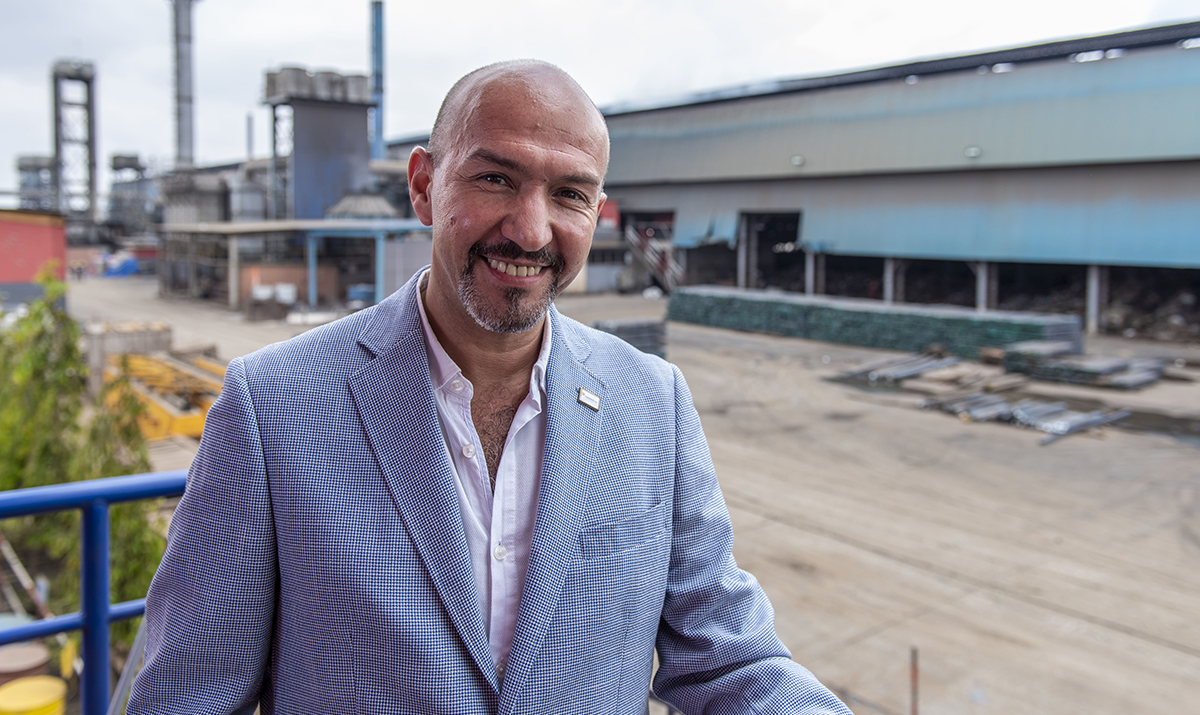
01 Jul Interview with Luis Diogo, CEO of Fabrimetal, Angola
BF: Fabrimetal is known for producing thermo-mechanically treated steel bars, stronger than ordinary steel, but how would you describe the company and its role in Angola’s business landscape?
DIOGO: I have been in Angola since 2007 and joined Fabrimetal in 2015. The company operates in the productive sector as a fundamental industry focused on steel production, using ferrous scrap as raw material. By sourcing most of our inputs locally, we contribute to the circular economy by transforming waste, adding value, and delivering high-quality steel products. Our main outputs include construction rods and specialized items for mechanics, the oil industry, and metal structures.
With a workforce of 800 Angolan employees and around 130 expatriates, Fabrimetal currently produces 15,000 tons of steel per month. Since 2016, exports have been a key driver of our growth, steadily increasing over the past four to five years. Today, 20–30% of our production goes to markets such as the Democratic Republic of Congo, Ghana, Senegal, and more recently, Cameroon.
Looking ahead, we are expanding our production capacity to 25,000 tons per month, reinforcing our commitment to exports and positioning Angola as a leading steel supplier on the continent.
BF: With U.S.-Angola relations strengthening, especially ahead of the U.S.-Africa Business Summit in Luanda in 2025, how do you view this partnership and what is your message to potential American investors?
DIOGO: This is a strategic and significant step for Angola. The United States, as a key global player, offers valuable partnerships that help diversify Angola’s financing options, reducing its past dependence on a single major partner like China. This creates a more balanced and competitive economic environment.
Beyond financing, structural investments are vital for national development and regional trade. Angola has historically been central to African trade corridors, and with recent improvements in rail, maritime, and port infrastructure, the country is now better positioned for export growth. These advances improve our ability to serve both domestic and international markets, making Angola an increasingly attractive destination for investors.
The upcoming summit will strengthen these ties and create new opportunities. Currently, Fabrimetal exports to the DRC, but high customs duties have limited our competitiveness in other markets. As Angola integrates further into SADC trade agreements, these barriers will fall, allowing us to expand more widely across the region.
Events like this are crucial for fostering investment, strengthening business networks, and creating greater predictability in Angola’s economy. Fabrimetal will actively participate, contributing to discussions that shape Angola’s industrial and trade future while showcasing our role in the country’s manufacturing sector.
BF: Is Fabrimetal open to potential joint-ventures?
DIOGO: A joint venture is not something we would dismiss, especially since Fabrimetal is part of a group operating in nine African countries, many already involving partnerships with local companies. In Angola, there is potential for collaboration, particularly as we expand our investments along the value chain. If the right opportunity arises, we would be open to exploring it.
BF: What would you say to investors about doing business in Angola, and what aspects of the country have you found most rewarding?
DIOGO: Investing in foreign markets requires commitment and vision. Angola has clear regulations and incentives, but like any emerging market, it comes with challenges. Unlike investing in Portugal or France, where processes are more predictable, Angola has complexities—but these can be managed given the country’s advantages.
First, Angola has a young and dynamic workforce, with about 65% of the population under 25. Second, it is rich in natural resources and offers opportunities across multiple sectors. Although infrastructure is still developing, government investments are improving conditions and opening new business opportunities.
Agribusiness, for instance, holds immense potential for both domestic consumption and regional exports. Angola’s integration into the SADC free trade area will also enhance competitiveness. Previously, high tariffs made it difficult to export to markets like Mozambique; soon, we will compete on equal terms within a 330-million-person market.
Despite global uncertainties such as the war in Ukraine and regional conflicts, Angola remains an attractive destination. The Lobito Corridor, public infrastructure projects, and diversification efforts are creating a promising future. With neighbors like Namibia and the DRC also experiencing growth, Angola’s strategic position is stronger than ever. Investing now means being part of this transformation.
BF: Could you share a bit about your professional background?
DIOGO: I am 51 and began my career in the Portuguese Army, where I served nine years. During that time, I trained in accounting and auditing and later completed a postgraduate degree in management.
In 2000, I left the Army and joined the automotive sector in Portugal as administrative and financial director for a group of companies. I experienced both growth and downturns, including a major crisis that heavily impacted the market.
Being of African descent, with my mother from Mozambique, I always felt a strong connection to the continent. In 2007, I planned to move to Mozambique but instead chose Angola, joining Ferpinta, a well-established industrial company with strong roots in Portugal and Europe. Over the years, I served as financial director and later general director.
Between 2012 and 2014, I worked in Mozambique on a plastics project that did not advance as expected, then moved into construction as a financial administrator before returning to Angola and joining Fabrimetal, where I have now been for ten years. This has been one of the most rewarding phases of my career, building a project that transforms raw materials into a sustainable business and creating opportunities in a market once reliant on imports.
Living and working in Africa has been fulfilling: I have my family with me, and I believe deeply in the potential here. Every effort has a visible impact, and even small initiatives can create meaningful change. In more developed economies, structures are already in place, and progress can be taken for granted. Here, every step forward makes a real difference.
